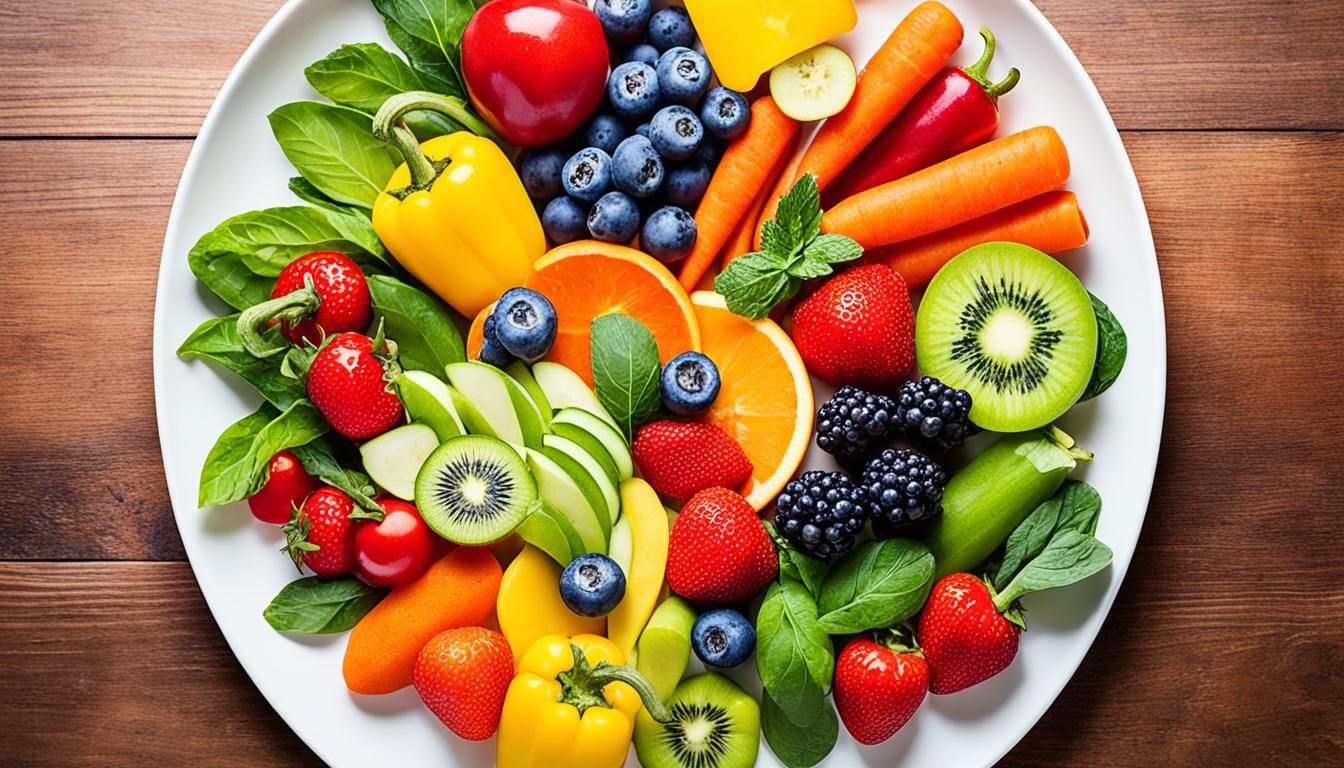Eating the right foods is essential for fueling your body and maximizing your workouts. Proper nutrition can improve your performance, help you recover faster, and support an active and healthy lifestyle. In this nutrition guide, we will explore the importance of healthy eating for fitness and provide tips for creating balanced meal plans.
Key Takeaways:
- Healthy eating is crucial for fueling your body and optimizing your workouts.
- Proper nutrition can enhance your performance, aid in muscle recovery, and support overall well-being.
- Clean eating for athletes involves choosing whole, unprocessed foods that provide essential nutrients.
- Creating balanced meal plans can help ensure you meet your nutritional needs and reach your fitness goals.
- Stay tuned for the following sections where we dive deeper into the role of nutrition in exercise performance, pre- and post-workout nutrition, hydration, and making smart food choices.
The Role of Nutrition in Exercise Performance
Nutrition plays a crucial role in exercise performance. What you eat before, during, and after your workouts can profoundly impact your energy levels, endurance, and muscle recovery. Consuming the right nutrients, such as carbohydrates, protein, and healthy fats, can provide the fuel your body needs to perform at its best.
Whether you’re a fitness enthusiast or an athlete, prioritizing the best foods for workouts is essential for maintaining a wellness-focused and active lifestyle. The right nutrition not only supports your physical performance but also contributes to your overall well-being.
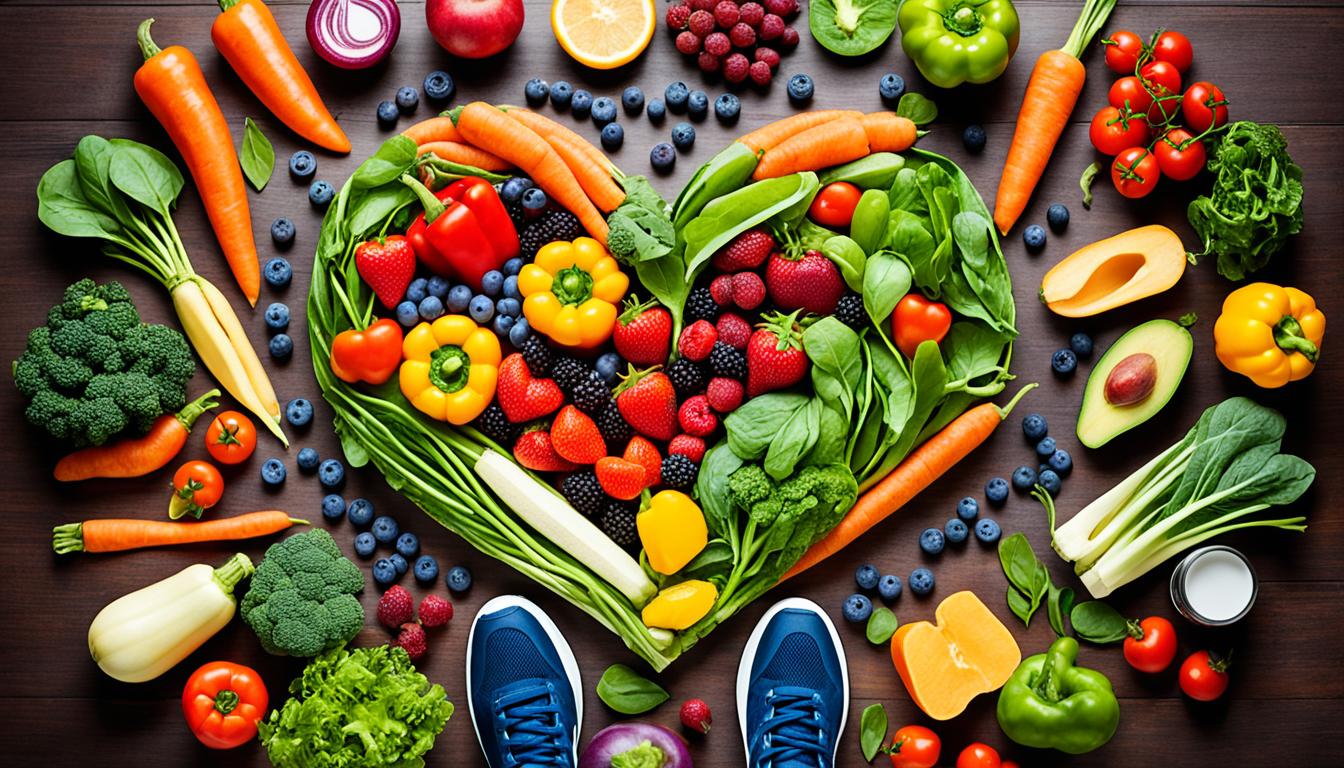
The Power of Pre-Workout Nutrition
Pre-workout nutrition sets the stage for a successful exercise session by providing your body with the necessary energy and nutrients. A balanced meal or snack before your workout can enhance performance and prevent fatigue during exercise.
Choosing whole, unprocessed foods rich in carbohydrates and proteins can help fuel your workouts and optimize your fitness journey.
For a pre-workout meal, include complex carbohydrates like whole grains, fruits, and vegetables, along with a lean protein source such as chicken, fish, or tofu. A blend of carbohydrates and protein ensures sustained energy levels and supports muscle building and repair.
Don’t forget the importance of hydration as part of pre-workout nutrition. Make sure to drink water or a sports drink to hydrate your body and prepare for a great workout.
Revitalize with Post-Workout Nutrition
After a challenging workout, your body needs proper nourishment to recover and repair. Post-workout nutrition is vital for replenishing glycogen stores and aiding in muscle recovery.
Optimize your post-workout nutrition with a combination of carbohydrates to replenish energy stores and protein to support muscle repair and growth.
Include a balance of complex carbohydrates and high-quality protein in your post-workout meal or snack. Examples include a protein shake with a banana, a turkey wrap with whole-grain bread, or Greek yogurt with berries and nuts.
Remember to drink water or a sports drink to rehydrate your body and replace any electrolytes lost during exercise.
By understanding the role of nutrition in exercise performance and making smart food choices, you can fuel your workouts, promote wellness for an active lifestyle, and maximize your fitness potential.
Fueling Your Workouts: Pre-Workout Nutrition
Proper pre-workout nutrition is key to providing your body with the energy it needs to sustain intense physical activity. Whether you’re hitting the gym, going for a run, or engaging in any other form of exercise, fueling your body adequately beforehand is crucial for optimal performance and preventing fatigue.
A balanced diet is essential when it comes to pre-workout meals or snacks. It’s important to choose foods that provide a mix of carbohydrates, protein, and healthy fats to give you sustained energy throughout your workout. Aim for a combination of complex carbohydrates like whole grains, lean proteins such as chicken or tofu, and healthy fats like avocado or nuts.
One of the most crucial meals of the day for athletes and fitness enthusiasts alike is breakfast. Eating a healthy breakfast before your workout can set the tone for the rest of the day and supply your body with the necessary fuel. Include foods such as oatmeal, Greek yogurt, fruits, and eggs to ensure you have a well-rounded and nutritious meal.
Eating a Healthy Breakfast
Eating a healthy breakfast before your workout sets the stage for success. It jumpstarts your metabolism, replenishes glycogen stores, and provides you with the energy you need to power through your exercises.
“Breakfast is the most important meal of the day, especially for those who are aiming to perform at their best during workouts,” says Dr. Emily Mitchell, a registered dietitian and sports nutritionist. “A balanced breakfast that includes carbohydrates, protein, and healthy fats can keep you fueled and focused, helping you crush your fitness goals.”
When choosing your pre-workout meal or snack, keep in mind the timing. Aim to eat at least one to three hours before exercise to allow your body enough time to digest the food and for nutrients to become available during your workout. If you prefer a smaller snack closer to your workout, opt for something easily digestible like a banana or a handful of almonds.
Portion sizes are also important. It’s best to avoid eating too much before your workout to prevent discomfort or digestive issues. Experiment with different portion sizes and listen to your body’s cues to find the right balance for you.
Remember, everyone is different, so it’s essential to listen to your body and find what works best for you. By following these balanced diet tips and incorporating essential nutrients into your pre-workout nutrition, you’ll be able to power through your workouts with energy and endurance.
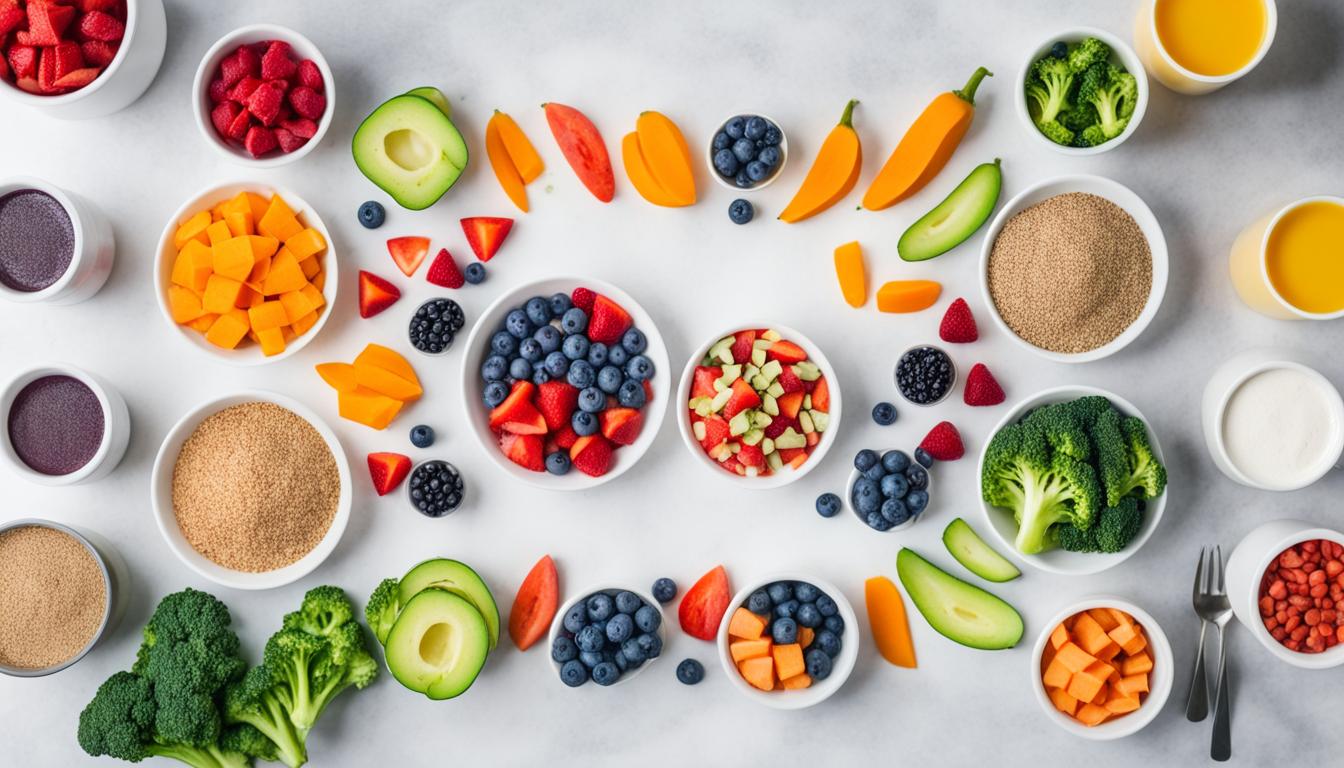
Maximizing Performance: During Workout Snacks
When it comes to maximizing your performance during longer or more intense workouts, your nutrition choices play a crucial role. Consuming a snack or sports drink during exercise can provide you with the necessary fuel to keep going strong and prevent hunger.
Choosing the right snacks can help sustain your energy levels and support your athletic goals. Opting for clean eating options, such as wholesome snacks, is key for athletes looking to optimize their performance. These snacks are rich in nutrients and can provide the necessary carbohydrates to fuel your muscles while keeping you satisfied.
For a quick and convenient option, consider packing a piece of fruit, like a banana or apple, and pairing it with a small handful of nuts or a tablespoon of nut butter. This combination of carbohydrates and healthy fats will provide sustained energy throughout your workout. It’s important to stay hydrated during your workouts as well. Remember to take small sips of water or a sports drink to replenish your fluids and maintain optimal performance.
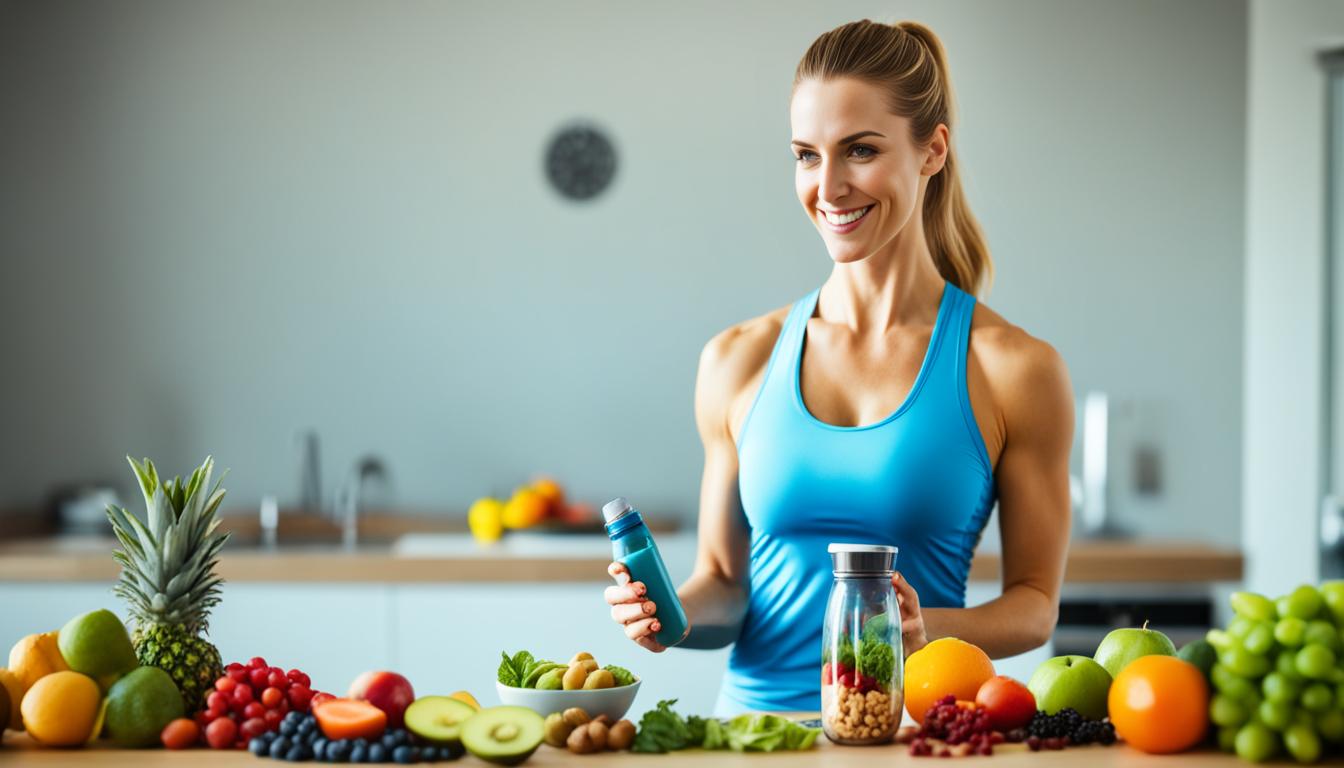
Choosing the right snacks and staying properly hydrated are essential for maximizing your performance during workouts. By fueling your body with clean, wholesome foods, you can ensure that you’re giving yourself the best chance to reach your fitness goals. So, grab your favorite workout snack and conquer your next training session!
Recovery and Replenishment: Post-Workout Nutrition
After a workout, your body needs to replenish glycogen stores and repair muscle damage. Consuming a combination of carbohydrates and protein within two hours of exercise can aid in muscle recovery and promote optimal performance in subsequent workouts. It’s essential to provide your body with the nutrients it needs to recover and rebuild.
The Power of Carbohydrates
Carbohydrates are crucial for replenishing glycogen, the stored form of glucose in your muscles. When you exercise, glycogen stores become depleted, and consuming carbs after your workout helps replenish them. Opt for complex carbohydrates like whole grains, fruits, and vegetables, which provide sustained energy and essential nutrients. Avoid processed and sugary carbs, as they offer little nutritional value.
The Role of Protein
Protein is essential for muscle repair and growth. It contains amino acids that aid in restoring damaged muscle fibers and promoting recovery. Include high-quality protein sources like lean meats, fish, poultry, beans, and legumes in your post-workout meals. If you prefer plant-based options, consider tofu, tempeh, quinoa, or plant-based protein powders.
Creating Balanced Post-Workout Meals
Here are some examples of nutritious post-workout meals and snacks:
Meal 1: Grilled chicken breast with roasted sweet potatoes and steamed broccoli.
Meal 2: Salmon with quinoa and sautéed spinach.
Snack 1: Greek yogurt with berries and a sprinkle of granola.
Snack 2: Whole grain toast with avocado and sliced hard-boiled eggs.
Remember to hydrate adequately after your workout. Drink water or incorporate electrolyte-rich beverages to restore hydration levels and support overall recovery.
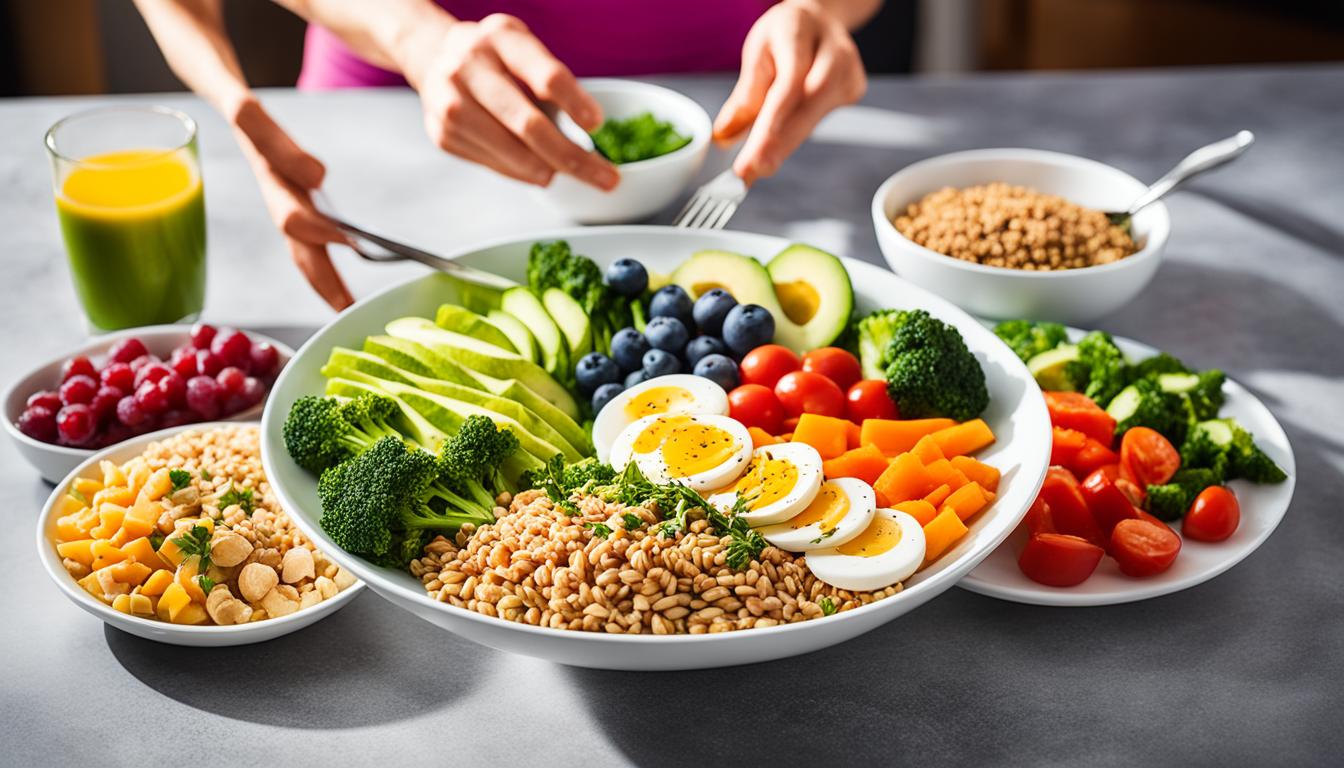
Replenishing your body with the right nutrients after exercise is crucial for optimizing your fitness goals. By following a balanced, nutritious post-workout meal plan, you can enhance muscle recovery, improve performance, and maintain an active and healthy lifestyle.
Hydration for Optimal Performance
Proper hydration is essential for maintaining optimal performance during your workouts. Staying hydrated not only helps you avoid fatigue and muscle cramps but also supports your cognitive function. Dehydration can hinder your progress and prevent you from achieving your fitness goals.
To ensure you stay properly hydrated, it’s important to hydrate before, during, and after your workouts. Before you hit the gym or start your exercise routine, make sure to drink water to prepare your body for the upcoming physical activity.
During your workouts, it’s vital to sip water regularly to replenish the fluids you lose through sweat. Remember, even mild dehydration can have a significant impact on your performance and overall well-being.
How Much Water Should You Drink?
The amount of water you need to drink depends on your body size and level of physical activity. As a general guideline, aim to consume at least eight glasses of water (64 ounces) per day. If you’re engaging in intense workouts or exercising in hot weather, you may need to drink more to compensate for the additional fluid loss.
It’s also worth mentioning the benefits of sports drinks, especially for longer and more intense workouts. These drinks contain electrolytes that help replenish your body’s mineral stores and provide energy. However, be mindful of their sugar content and opt for options with lower sugar levels or consider diluting them with water to reduce the overall sugar intake.
Remember, staying properly hydrated is an essential part of your wellness journey and active lifestyle. It helps you perform at your best, recover faster, and maximize the benefits of your fitness nutrition guide.
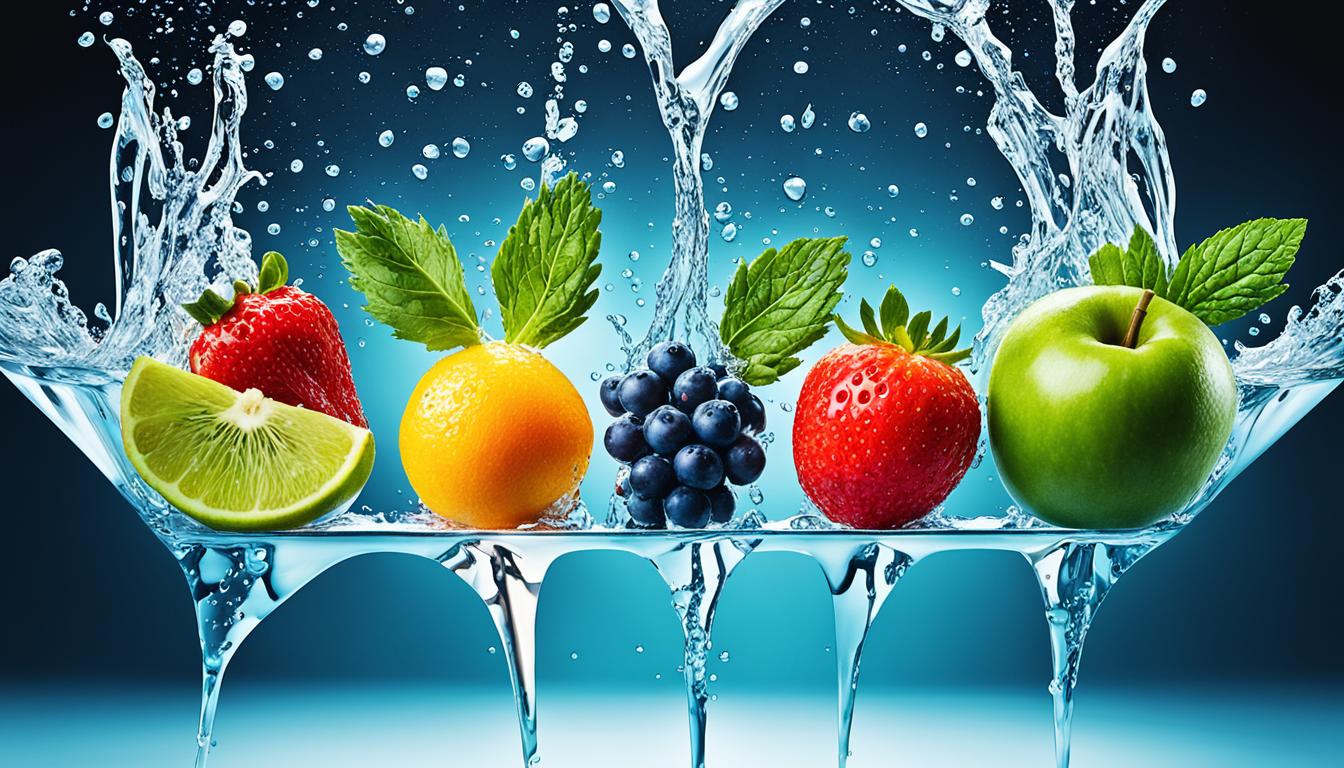
Making Smart Food Choices
When it comes to healthy eating for fitness, making smart food choices is essential. By prioritizing the right foods, you can optimize your nutrition for fitness and fuel your body for peak performance.
Keep A Food Diary
One effective way to ensure you’re making healthy choices is to keep a food diary. Documenting your meals and snacks can help you identify patterns, track your calorie intake, and make adjustments as needed. It’s a great tool for staying accountable and mindful of what you’re consuming.
Calculate Calories
Calculating calories can give you a better understanding of the energy you’re taking in and help you maintain a balanced diet. There are many online tools and mobile apps available that can assist you in calculating the calories in your meals and snacks. By monitoring your calorie intake, you can make informed decisions and make adjustments to achieve your fitness goals.
Measure Food Portions
Measuring food portions is another effective strategy for maintaining a healthy diet. It allows you to control your serving sizes and ensure you’re consuming the right amounts of each food group. Use measuring cups, a food scale, or portion control plates to help you accurately measure your food portions.
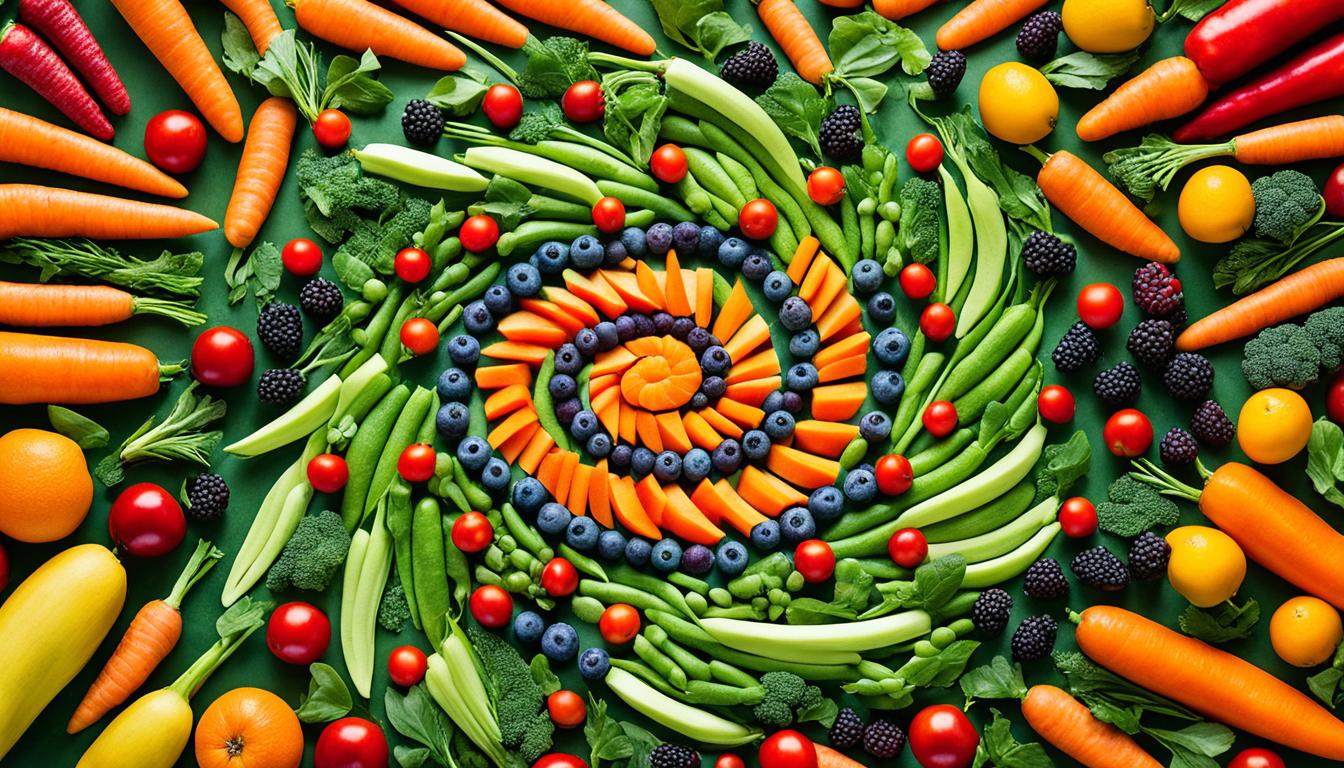
Choose the Right Foods
When planning your meals, prioritize nutrient-dense foods that provide essential vitamins and minerals. Include whole grains, lean proteins, fruits, vegetables, and healthy fats in your diet. These foods provide the necessary fuel for your workouts and support an overall healthy lifestyle.
“Nutrition for fitness is all about making informed choices and nourishing your body with the right foods. By focusing on whole, unprocessed options, you can maximize your energy levels, support muscle recovery, and achieve your fitness goals.”
Avoid Processed and Sugary Foods
Processed and sugary foods offer little nutritional value and can hinder your progress towards optimal fitness. Limit your intake of processed snacks, sugary drinks, and desserts. Opt for healthier alternatives such as fresh fruit, homemade energy bars, and natural sweeteners to satisfy your cravings.
By making smart food choices, you can prioritize nutrition for fitness and fuel your body to perform at its best. Remember to listen to your body, adapt your diet to your individual needs, and enjoy a balanced and wholesome approach to healthy eating.
Conclusion
Healthy eating is essential for achieving and maintaining your fitness goals. When you fuel your body with the right nutrients at the right times, you optimize your exercise performance, support muscle recovery, and improve your overall well-being. By listening to your body and making adjustments based on your individual needs and preferences, you can create a balanced and nutritious diet that unlocks your peak performance and allows you to enjoy a vibrant, active lifestyle.
To achieve optimal results, remember to prioritize nutrition for fitness by incorporating a variety of whole foods into your diet. Focus on consuming lean proteins, such as chicken, fish, and tofu, along with whole grains like quinoa and brown rice. Don’t forget to include plenty of fruits and vegetables, which provide essential vitamins, minerals, and antioxidants. Additionally, incorporating healthy fats from sources like avocados, nuts, and olive oil can further support your fitness journey.
For a balanced diet, it’s important to pay attention to portion sizes and avoid overeating. Keep a food diary to track your meals and calculate the number of calories you consume. This will help you better understand your dietary habits and make any necessary adjustments. Remember, small changes can make a big difference, so focus on making gradual improvements to your eating habits. With a commitment to nutrition for fitness, you can reach your goals and maintain a healthy and active lifestyle for years to come.
FAQ
What role does nutrition play in exercise performance?
Nutrition plays a crucial role in exercise performance by providing the fuel your body needs to perform at its best. Consuming the right nutrients, such as carbohydrates, protein, and healthy fats, can improve energy levels, endurance, and muscle recovery.
Why is pre-workout nutrition important?
Pre-workout nutrition is essential for providing your body with the energy it needs to sustain intense physical activity. Consuming a balanced meal or snack before your workout can enhance performance and prevent fatigue.
What should I eat before a workout?
Eating a healthy breakfast before a workout is important. Aim for a combination of carbohydrates and protein, such as whole grain toast with peanut butter or yogurt with fruit. It’s also crucial to choose the right portion sizes based on your individual needs and preferences.
Should I consume snacks or sports drinks during my workouts?
For longer or more intense workouts, it may be beneficial to consume a snack or sports drink to provide additional carbohydrates and prevent hunger. Opt for options like bananas, granola bars, or electrolyte-rich sports drinks.
What should I eat after a workout?
After a workout, it’s important to replenish glycogen stores and repair muscle damage. Consuming a combination of carbohydrates and protein within two hours of exercise can aid in muscle recovery. Some examples of nutritious post-workout meals and snacks include a chicken and quinoa salad or a protein smoothie with mixed berries.
How important is hydration for exercise performance?
Hydration is vital for maintaining optimal performance during exercise. Dehydration can lead to fatigue, muscle cramps, and impaired cognitive function. It’s important to stay hydrated before, during, and after your workouts by drinking water or electrolyte-based sports drinks.
How can I make smart food choices for fitness?
To make smart food choices for fitness, prioritize whole grains, lean proteins, fruits, vegetables, and healthy fats in your diet. Keep a food diary, calculate calories, and measure food portions to ensure you’re getting the right nutrients. Avoid processed and sugary foods that offer little nutritional value.
What is the importance of a balanced diet for fitness?
A balanced diet is crucial for achieving and maintaining fitness goals. By fueling your body with the right nutrients, you can optimize exercise performance, support muscle recovery, and improve overall well-being. Listen to your body and make adjustments based on your individual needs and preferences.
Source Links
- https://www.excellenceinfitness.com/blog/nutrition-for-fitness-training-the-facts-you-need-to-know
- https://www.mayoclinic.org/healthy-lifestyle/fitness/in-depth/exercise/art-20045506
- https://www.healthline.com/health/fitness-exercise-eating-healthy

